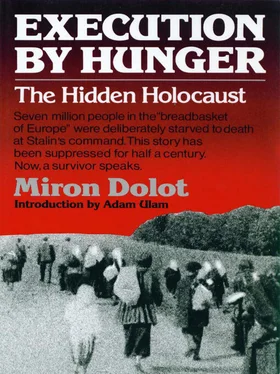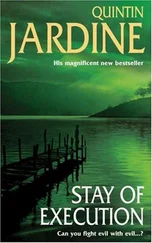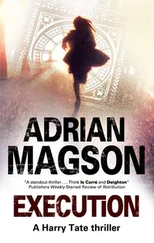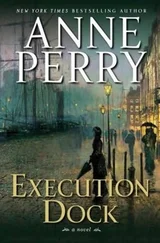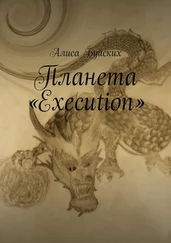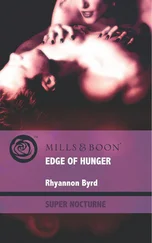Many tragic incidents happened along the way. A youth of about sixteen, tried to escape. He jumped off the sleigh and dashed into a backyard, but the machine gun crew opened fire and pinned him down. He was wounded, seized, and brought back to the column. Disregarding his wound, the guards tied him to the wagon by ropes. The wound proved to be fatal, and he died before the column reached the railroad station.
A GPU soldier was riding in a sleigh with one family. Ignoring all the people around him, the soldier started to make improper advances to a young girl. When he continued to annoy her, the girl’s mother lost her temper, and struck him in the face. The soldier grabbed his gun, and shot the mother point-blank, killing her.
Upon reaching the railroad station, the girl was approached by the GPU officer who was in charge of the column. Speaking loudly enough to let everybody hear him, he informed her that her mother was killed by the soldier in self-defense. Her mother, an “arrested enemy of the people,” he said, assaulted the guard with the intention of starting a riot among the convicted kurkuls. Thus, the action of the soldier was legitimate, patriotic, and even heroic. The girl and her two younger brothers were then taken away from the column and never seen again.
The news about the boy and the woman had not yet reached the rear of the column before several other incidents occurred. A few of the older men, among them my Uncle Havrylo, could not withstand the hardships and brutality and died before reaching the railroad station. A young couple committed suicide by slashing their veins.
As the snow continued to fall, some of the sleighs became stuck, and when this happened, the entire column had to stop. The men had to help the horses amidst the shouting and firing of the militiamen and the GPU soldiers and the screams and cries of the women and children.
A few miles from the railroad station, the column took a field road toward the railroad tracks. A freight train stood in the field on auxiliary rails. The front cars had already been filled with arrested farmers from other villages. Soldiers of the regular army stood guard at every car.
As soon as the column reached the train, the GPU officer passed the order that all had to remain in their sleighs. Guards took positions around the column. Without delay, the GPU agent moved from sleigh to sleigh with list in hand, calling the roll. Then the checked groups were escorted to the train immediately and herded into the cars, group after group.
When the first car was filled and locked, all realized that wives were separated from their husbands, and children from their parents. An angry murmur rushed through the column as the men claimed the right to be with their own families. A boy ran to the car that held his parents. A machine gun fired warning shots over the heads of the people, but the boy kept running. Three more shots rang out, and the boy fell dead.
At this point, the unrest turned into turmoil. Skirmishes broke out as people tried to escape. Several men broke from the column and ran toward the bushes that bordered the fields. A sleigh driver tried to escape as he urged the horses away from the station. Guardsmen opened fire, and the men running to the bushes fell and lay still. The man and his family on the sleigh did not escape death either. A machine gun caught up with them; he and his wife were killed, and his elderly mother and three children wounded.
Facing guns from every direction, the arrested farmers finally gave up, and order and silence were restored.
Group after group disappeared into the cattle cars. When the loading was completed, the doors were closed and locked, and a guard posted at each door. The dead were left behind in the field.
Vasylyk was in the last car. He was lucky enough to have his entire family with him, but it was torture for him to see his parents and his sister suffering under such horrible conditions. There were at least fifty people in his car, all herded into the cars that had been designed for livestock transportation. There were no beds or seats. The wooden floor, pierced by holes, was the only place where they could sit: there was no place where the sick could lie down.
It was dark inside the cars when the doors were closed. Only feeble shafts of daylight penetrated the cracks in the sides of the car. There was total confusion: those standing tried to find a place to sit down, and those sitting were trampled by the ones standing. There was shouting and arguing, and women were weeping for their husbands who were packed into other cars. Children cried for food; all suffered from the cold.
The lack of food and adequate clothing aggravated the situation. The arrested had been prohibited from taking any of their possessions, except for the personal belongings they could carry. And, since no one suspected that he or she would have to leave their home or village, the majority had failed to take their most needed belongings.
A pail in the middle of the cattle-car served as a toilet for all fifty people. A throng of people continually stood and waited their turn. Those who wanted to reach it had to literally walk over those sitting on the floor. This embarrassing situation increased the arguing and fighting.
The attempts to call the attention of the officials to the unbearable conditions were unsuccessful. Thus, hungry and cold, crowded together in the stinking cars, the arrested began their forced journey to an unknown destination.
The train was set in motion around midnight. When it crossed the bridge over the Dnipro River, all realized that it was heading north. The train moved slowly, and often stopped. At times, it stood still for hours. During one stop the door was unlocked and opened halfway. The first thing the arrested saw were two soldiers armed with rifles, ready to shoot. Another group of soldiers waited with sacks and buckets. The officer in charge announced that a loaf of bread would be given to every four persons and a herring to each. The water would be distributed from the buckets. The arrested were warned that those buckets were government property, and it was the responsibility of everyone in the car to see that they did not get damaged. A “supervisor” of the car had to be chosen who would be responsible for the distribution of the food and water, and for keeping order and “cleanliness” in the car which still had no proper sanitation facilities.
After these brief instructions, the soldiers shoved the sacks containing the bread and herrings and the buckets of water into the car and the door was locked again.
Immediately, the hungry people started shoving and arguing. Each had their own idea of how the food and water should be distributed. Opinions were expressed loudly. The strong pushed aside the weaker. The shouting and fighting were accompanied by the pitiful whining of the children.
Choosing a supervisor from among the group was a problem, for the position would naturally associate the individual with the officials. Nevertheless, one was chosen and the distribution of the food began.
Toward morning on the second day of the journey, a desperate cry of a woman woke up those who were still asleep: her husband had died. During the riot in the village square, he had been slightly wounded by a bullet in his leg. Afraid to be separated from his wife and then killed somewhere behind the walls of a GPU prison, he concealed his wound from the officials. A subsequent infection killed him. His corpse was removed at the next station stop. The sobbing wife of the deceased husband begged the officials for permission to be present at his funeral, but she was not even permitted to step out of the car. The men who carried the body away said there were many deaths on the train that night, and their corpses were piled up on the platform.
Читать дальше
